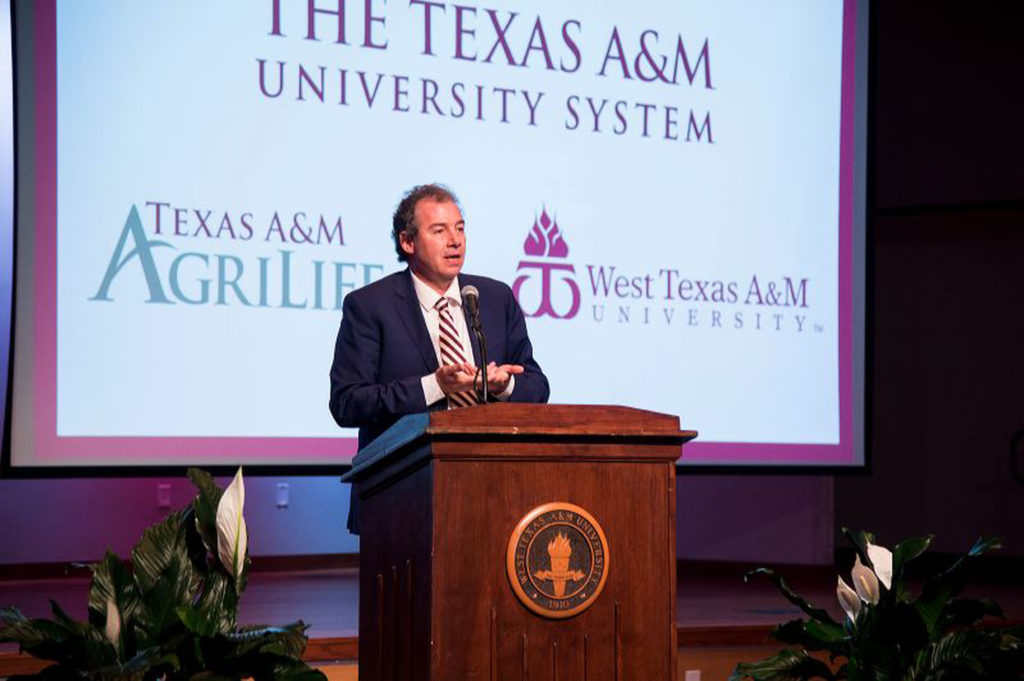WT, AgriLife announce $1 million Texas A&M Chancellor’s Research Initiative
National search begins for water-focused researchers
WRITER: Brittany Castillo, 806-651-2682, [email protected]
CONTACT: Dr. Angela Spaulding, 806-651-2731 [email protected];
Dr. Kevin Pond, 806-651-2550, [email protected];
Dr. Emily Hunt, 806-651-5257, [email protected]

CANYON — Officials from The Texas A&M University System, TAMUS, announced a Chancellor’s Research Initiative, or CRI, between two agency members – West Texas A&M University and Texas A&M AgriLife on May 23 in West Texas A&M’s Legacy Hall.
Texas A&M AgriLife’s commitment will involve both Texas A&M AgriLife Research and the Texas A&M AgriLife Extension Service.
With the economic value of the Texas Panhandle doubling in the last 20 years, the university system created the CRI to bring together human resources to secure the sustainability of the region through efficient water irrigation and agricultural methods.
The initiative focuses on building a new body of research to investigate the use of the Ogallala Aquifer and develop engineering systems for the inevitable depletion of those water resources. Currently, the region produces $5.7 billion of agricultural products annually and supports 51,590 jobs in the local agribusiness sector.
The initiative includes $1 million from CRI funds to assist West Texas A&M and Texas A&M AgriLife in leveraging current water-optimized agriculture resources and to purchase laboratory and field equipment to build a water engineering program for graduate students, research associates and recruited scientists and engineers.
“Texas A&M AgriLife and West Texas A&M University share common interests in addressing the needs of local stakeholders through cutting-edge research and excellence in education,” said Dr. Patrick Stover, vice chancellor, dean of agriculture and life sciences at Texas A&M AgriLife and director of Texas A&M AgriLife Research.
“We value the ability to partner with System universities to extend our reach, leverage existing expertise in natural resource management and precision agriculture, and thus address the needs of all Texans,” Stover said.
The first step will be hiring two nationally prominent researchers with expertise in water engineering and water-optimized agriculture to build a water engineering team based in Canyon.
The researchers will be associate professors, and both will have a 50/50 joint appointment with West Texas A&M and another TAMUS partner to ensure sound scientific collaboration.
The selected associate professor of agriculture will work closely with the Paul Engler College of Agriculture and Natural Sciences, or PECANS, and Texas A&M AgriLife Research as the director of the Dryland Agriculture Institute. This position will emphasize applied research in and synthesis of cropping and integrated crop-livestock systems, agronomy, crop improvement, pest management, plant physiology and soil science.
The associate professor of water resources engineering will work closely with the School of Engineering, Computer Sciences and Mathematics, SECSM, and Texas A&M’s department of biological and agricultural engineering, BAEN, with funding through the Texas A&M AgriLife Extension Service program within BAEN. This position will emphasize applied research in water engineering and may be supported by a research assistant and an extension program specialist to facilitate development, demonstration and implementation of advanced technologies.
“The collaboration between PECANS, SECSM and AgriLife is to establish this region as a hub for water and energy research,” said Dr. Angela Spaulding, vice president of research and compliance and dean of the Graduate School at West Texas A&M.
“This includes the development of a research team to aggressively address known challenges to the primary components of the rural Texas Panhandle region such as a declining aquifer, agricultural production/profitability, and oil, wind and solar energy,” Spaulding said. “We’re excited to announce the first steps toward building this team with the two open positions created for water and energy researchers.”
Although water engineering research will be a new emphasis at West Texas A&M, current university developments, such as existing patented solutions for sustainable energy storage and links to water-related research in the Ogallala Aquifer Program through associated faculty members, support this initiative.
The CRI will strengthen this region’s water-related priorities as well as build the foundation for a future doctoral program in water engineering, which aligns with the mission for WT to reach doctoral status by 2035 as described in WT 125: From the Panhandle to the World.
Impending work for the program will include projects that regenerate soils to enhance rainfall capture; reduce water demand of regionally appropriate field crops; optimize groundwater extraction for agricultural profitability; capitalize on unmanned aerial technologies for remote sensing of cropland and rangeland health status; and demonstrate management approaches that capitalize modern breeding and genetics programs in wheat, sorghum, corn, cotton and vegetables.
While specialized, water engineering research will not be limited to agriculture and engineering. The CRI supports cross disciplines by influencing integral big data, social science and policy development through research and interpretation of water irrigation. This field of research will invite collaboration and cooperation across campus and the region and lead to effective practices that relate to water conservation, and ultimately help sustain the Panhandle region.
The national search for two researchers with expertise in water engineering and water-optimized agriculture will start immediately.


